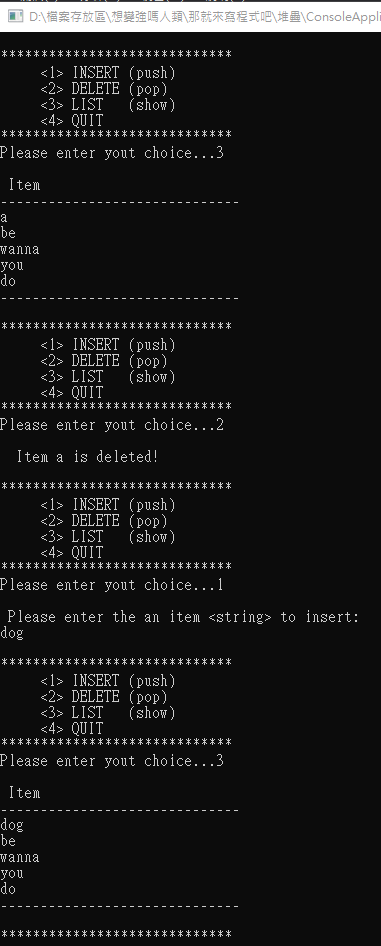複習以先進後出的堆疊(Stack)來處理資料。
完整程式碼:
// 使用stack 處理資料:新增,刪除,輸出
#include "pch.h"
#include<stdio.h>
#include<stdlib.h>
#include<conio.h>
void push_s(void);
void pop_s(void);
void list_s(void);
#define MAX 4
char item[MAX][20];
int point = -1;
int main()
{
char chos;
while (1) {
printf("\n*****************************");
printf("\n <1> INSERT (push)");
printf("\n <2> DELETE (pop)");
printf("\n <3> LIST (show)");
printf("\n <4> QUIT ");
printf("\n*****************************");
printf("\nPlease enter yout choice...");
chos = _getche();
switch(chos) {
case '1':
push_s();
break;
case '2':
pop_s();
break;
case '3':
list_s();
break;
case '4':
exit(0);
break;
default:
printf("\n The input is error!!! \n");
}
}
}
void push_s() {
//判斷是否可以push
if (point > MAX - 1) {
printf("\n\n Stack is full ! \n");
//滿了
}
else {
point++;
printf("\n\n Please enter the an item <string> to insert: \n");
scanf_s("%s",item[point]);
//push
}
}
void pop_s() {
//判斷是否可以pop
if (point == -1) {
//空了
printf("\n\n No item, the stack is empty! \n");
}
else {
//可以delete
printf("\n\n Item %s is deleted! \n", item[point]);
point--;
}
//pop
}
void list_s() {
//顯示目前的stack
printf("\n\n Item \n");
printf("------------------------------\n");
if (point > -1) {
for (int i = 0; i <= point; i++) {
printf("%s\n", item[point-i]);
}
}
printf("------------------------------\n");
}
執行結果:

_______________________________________________
我們透過閱讀,拼湊出真實世界的面貌,
並在反覆的探索及思維中,打破由自我無知與偏見所建立的籓籬。